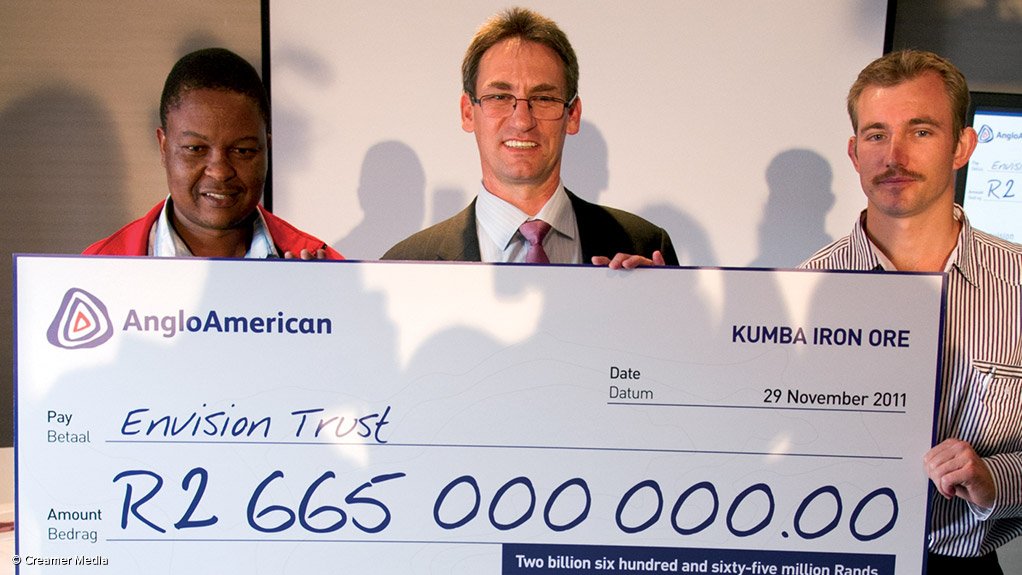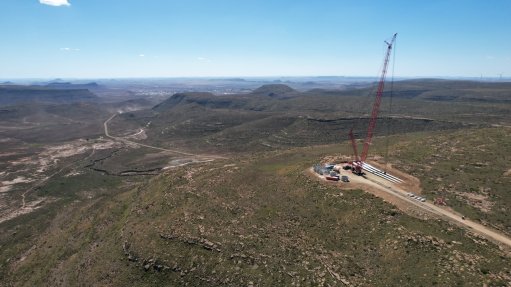Platinum execs without incentive pay since 2008 – Griffith


Flashback to when Amplats CEOChris Griffith (centre) made workers half millionaires at Kumba in 2011
Photo by Duane Daws
JOHANNESBURG (miningweekly.com) – Most executives in platinum mining had not received long-term incentive pay for the last six years because of the poor state of the industry, Anglo American Platinum (Amplats) CEO Chris Griffith said on Tuesday.
Questioned by Radio 702 talk-show host John Robbie on his reported salary of R17.6-million a year – which Robbie said striking workers might see as “obscene”, Griffith replied that there was a big difference between the reported figure and the amount that he actually took home, because half of it was based on potential future benefits, which had not materialised for any of the executives since 2008, owing to the poor state of the platinum-mining industry.
Griffith contended that even if executives opted to work for no pay at all, it would make negligible difference to the overall wage bill, of which executive pay represented a mere fraction of a per cent.
Mining Weekly Online is able to point out that, as the former Kumba Iron Ore CEO, Griffith showed a willingness to reward employees hugely in 2011, when he paid out a whopping R2.7-billion to Kumba’s 6 209 workforce, turning each of them into pretax half millionaires overnight, in what was the first phase of the iron-ore company’s employee share ownership plan (Esop).
The beneficiaries of the Kumba Esop were all below managerial level, and Griffith heaped praise on them at the time for being the people “who drive the business from its heart”.
“This is the most successful Esop in South Africa’s history,” said Solidarity labour union national organiser Louis Pretorius at the time, and the then National Union of Mineworkers spokesperson Lesiba Seshoka also praised the payout. (See celebratory picture attached with union representatives flanking Griffith).
But when Griffith took over Amplats from Neville Nicolau, who quit in 2012, it was already struggling and had none of the Kumba-type success that would have given Griffith the leeway to dish out large rewards to workers, which he showed keenness to do during his Kumba tenure.
“It does seem that we’re so far apart that a deal with AMCU [Association of Mineworkers and Construction Union] at this point in time seems completely out of the question,” Griffith told the radio station, adding that the AMCU demand represented a 100% increase or 30% pay increase, depending on the offer agreed.
“We think we’ve got a fair offer on table of between 7.5% and 10% at the lowest level, which is significantly above inflation, and we think that is an offer that is affordable by the companies.
“When the unions say the company can afford their offer, the very lowest offer means an increase in wages of R4.5-billion for Amplats just year-on-year.
“Our debt level, which was R10.5-billion at the beginning of 2013, went to R11.5-billion at the beginning of this year and is already at R13-billion debt.
“If we were to add R4.5-billion of debt on to that, we would stop this company within a year or two and that clearly cannot be to the long-term benefit of all of the employees that work for us,” he added.
Robbie then put it to him that AMCU would question how Amplats could afford to pay such high executive salaries.
“Your total package is R17.6-million. They would say that’s obscene. Can you justify that?” Robbie asked.
Griffith conceded that in a public debate around executive salaries, “I’m never going to win any argument”, even though slashing executive pay would not be the solution.
Ultimately there was a plan to raise the wage levels of employees but that was going to mean that skilled labour would make use of more mechanised equipment and ultimately there would be fewer people employed as a result of the mechanisation in a country that had low skills and high unemployment.
“There needs to be very careful debate in the country about the elevation of fewer people to higher levels of salary and have more people sit on the streets with no work,” said Griffith, adding that the conversation that the platinum companies were having with government was not negative.
“Ultimately, over time, mining companies have every intention, notwithstanding the fact that fewer people will be employed, of offering our existing workforce higher skills and higher pay.
“That’s going to take a long time, though. We’re not in a negative discussion with the government around that. The majority of our unions have accepted this rationale,” he said.
All three of the concerned platinum-mining companies had made use of interactive voice response technology (IVR) to explore the willingness of employees to return to work.
The simple messages put out on the IVR system in various languages showed that the majority of Lonmin, Impala Paltinum and Amplats employees wanted to accept the offer on the table and return to work, he added.
Comments
Press Office
Announcements
What's On
Subscribe to improve your user experience...
Option 1 (equivalent of R125 a month):
Receive a weekly copy of Creamer Media's Engineering News & Mining Weekly magazine
(print copy for those in South Africa and e-magazine for those outside of South Africa)
Receive daily email newsletters
Access to full search results
Access archive of magazine back copies
Access to Projects in Progress
Access to ONE Research Report of your choice in PDF format
Option 2 (equivalent of R375 a month):
All benefits from Option 1
PLUS
Access to Creamer Media's Research Channel Africa for ALL Research Reports, in PDF format, on various industrial and mining sectors
including Electricity; Water; Energy Transition; Hydrogen; Roads, Rail and Ports; Coal; Gold; Platinum; Battery Metals; etc.
Already a subscriber?
Forgotten your password?
Receive weekly copy of Creamer Media's Engineering News & Mining Weekly magazine (print copy for those in South Africa and e-magazine for those outside of South Africa)
➕
Recieve daily email newsletters
➕
Access to full search results
➕
Access archive of magazine back copies
➕
Access to Projects in Progress
➕
Access to ONE Research Report of your choice in PDF format
RESEARCH CHANNEL AFRICA
R4500 (equivalent of R375 a month)
SUBSCRIBEAll benefits from Option 1
➕
Access to Creamer Media's Research Channel Africa for ALL Research Reports on various industrial and mining sectors, in PDF format, including on:
Electricity
➕
Water
➕
Energy Transition
➕
Hydrogen
➕
Roads, Rail and Ports
➕
Coal
➕
Gold
➕
Platinum
➕
Battery Metals
➕
etc.
Receive all benefits from Option 1 or Option 2 delivered to numerous people at your company
➕
Multiple User names and Passwords for simultaneous log-ins
➕
Intranet integration access to all in your organisation



















